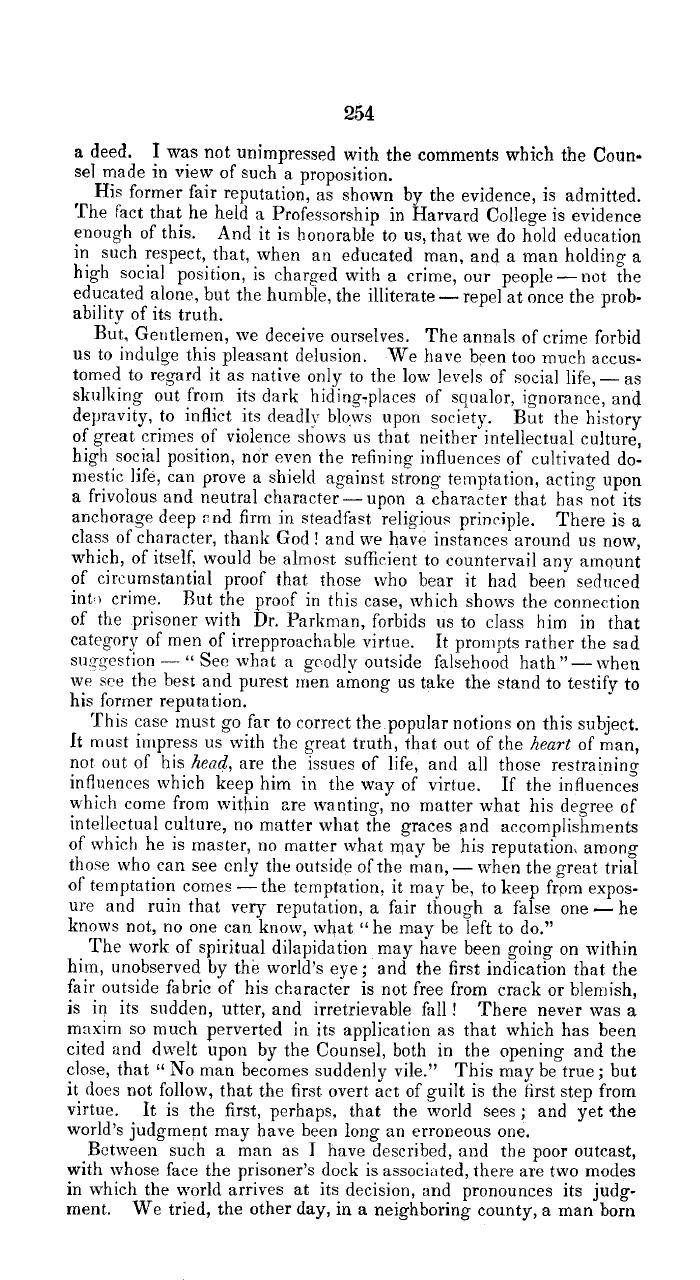|
254
a deed. I was not unimpressed with the comments which the Coun-
sel made in view of such a proposition.
His former fair reputation, as shown by the evidence, is admitted.
The fact that he held a Professorship in Harvard College is evidence
enough of this. And it is honorable to us, that we do hold education
in such respect, that, when an educated man, and a man holding a
high social position, is charged with a crime, our people-not the
educated alone, but the humble, the illiterate-repel at once the prob-
ability of its truth.
But, Gentlemen, we deceive ourselves. The annals of crime forbid
us to indulge this pleasant delusion. We have been too much accus-
tomed to regard it as native only to the low levels of social life,-as
skulking out from its dark hiding-places of squalor, ignorance, and
depravity, to inflict its deadly blows upon society. But the history
of great crimes of violence shows us that neither intellectual culture,
high social position, nor even the refining influences of cultivated do-
mestic life, can prove a shield against strong temptation, acting upon
a frivolous and neutral character-upon a character that has not its
anchorage deep .^nd firm in steadfast religious principle. There is a
class of character, thank God ! and we have instances around us now,
which, of itself, would be almost sufficient to countervail any amount
of circumstantial proof that those who bear it had been seduced
into crime. But the proof in this case, which shows the connection
of the prisoner with Dr. Parkman, forbids us to class him in that
category of men of irrepproachable virtue. It prompts rather the sad
swrgestion -" See what a gcodly outside falsehood hath"-when
we see the best and purest men among us take the stand to testify to
his former reputation.
This case must go far to correct the. popular notions on this subject.
It must impress us with the great truth, that out of the heart of man,
not out of his head, are the issues of life, and all those restraining
influences which keep him in the way of virtue. If the influences
which come from within are wanting, no matter what his degree of
intellectual culture, no matter what the graces and accomplishments
of which he is master, no matter what may be his reputation, among
those who can see only the outside of the man, - when the great trial
of temptation comes-the temptation, it may be, to keep from expos-
ure and ruin that very reputation, a fair though a false one - he
knows not, no one can know, what "he may be left to do."
The work of spiritual dilapidation may have been going on within
him, unobserved by the world's eye; and the first indication that the
fair outside fabric of his character is not free from crack or blemish,
is in its sudden, utter, and irretrievable fall ! There never was a
maxim so much perverted in its application as that which has been
cited and dwelt upon by the Counsel, both in the opening and the
close, that °° No man becomes suddenly vile." This may be true; but
it does not follow, that the first. overt act of guilt is the first step
from
virtue. It is the first, perhaps, that the world sees; and yet the
world's judgment may have been long an erroneous one.
Between such a man as I have described, and the poor outcast,
with whose face the prisoner's dock is associated, there are two modes
in which the world arrives at its decision, and pronounces its judg-
ment. We tried, the other day, in a neighboring county, a man born
|

